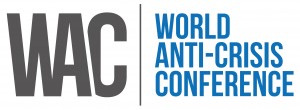 ASTANA – The hypothesis that the developed world may have to get used to perpetually low nominal interest rates and financial bubbles in order to reach full employment was among the maintopics discussed at the second World Anti-Crisis Conference “Regaining Confidence in Global Finance System. Breaking the Cycle of Financial Crisis.” The conference was part of the May 21-23 seventh Astana Economic Forum.
ASTANA – The hypothesis that the developed world may have to get used to perpetually low nominal interest rates and financial bubbles in order to reach full employment was among the maintopics discussed at the second World Anti-Crisis Conference “Regaining Confidence in Global Finance System. Breaking the Cycle of Financial Crisis.” The conference was part of the May 21-23 seventh Astana Economic Forum.
“The biggest thing we have learned in recent years is that any financial, economic, social or political crisis can only be overcome after the old order and way of doing things are replaced with something fresh.The international projectG-Global, initiated by President Nursultan Nazarbayevin December 2011 thatwas proposed at the G-20 Summit in St. Petersburg, can serve as the fundamental basis for a balanced and comprehensive dialogue,”noted Deputy Prime Minister and Minister of Finance of Kazakhstan Bakhyt Sultanov in his welcoming speech.
He underlined that the G-Global format was initiated to encourage equitable and democratic participation among all UN member states.
“G-Global is a multifaceted platform that brings together the entire international community for developments and recommendations on global challenges. Today, it is already being implemented through online resources and has proven the effectiveness of integrated mechanisms, finding solutions to various issues,” he said.
Fouad Siniora, former prime minister of Lebanon pointed out in his speech thatthere is a lot to gainfrom examiningthe Middle East because of the region’srich resources. According to him, the Middle East also needs investment, infrastructure modernisation, new education standards and, most importantly, opportunities for young people to fulfil their dreams, which wasthe main issue driving the Arab Spring.The main reason for stagnation in the region is six decades of political instability, the former prime minister of Lebanon said. Siniora sees Western support as the key to solving these problems. He cited Turkey as a good example because the possibility of joining the EU encouraged it to enact the reforms that propelled it into the top 20 economies.
“Syria risks destabilising the entire world,” he said, pointing out that everyone must be a part of a regionally oriented political solution to Syria’s war and that leaving it to the presidents of neighbouring countries would not suffice. “Help us help you. Investing in the Middle East, you are investing in hope. Help us establish peace in the Middle East,” he said.
The conference was held on the 70th anniversary of the Bretton Woods Agreement. Executive Director of the Reinventing Bretton Woods Committee Mark Uzan, who took part in creating the World Anti-Crisis Plan concept and promoting the Kazakh initiative, pointed out that the current global economic crisis will continue to significantly impact the world. He said that, “The world will change in the next 20 years.” The expert also asked, “If we prepare a plan, will it mean the end of the crisis?” He added that the crisis facing developed countries has both internal and external origins and, therefore, needs teamwork to be solved.
Session moderator, Managing Director of Pramerica Investment Management Ousmene Mandeng said that economic stagnation may positively affect developing countries because stagnation is mainly afflicting developed countries. Mandeng stumped participants when he asked, “What could happen if developing countries take advantage of this stagnation?”
The President of the Japan Centre for Economic Research, Deputy Governor of the Bank of Japan (2003-2008) Kazumasa Iwata discussed Japan’s experience. As he pointed out, work force reduction, together with the effects of financial globalisation and facilitation of the slow post-crisis recovery, require long-term effective plans. Iwata said that, “The successful growth strategy demands on prevention foster bubbles and a build-up of leverage and monetary accommodation.”
Senior Fellow at the Institute for Global Affairs at Yale University, Chairman of the Advisory Company DFC Associates, LLC Domingo Cavallo is well-known in the financial world. . The economist listedBolivia, Peru and Paraguay as success stories and offered solutions to dollar dependency. “Forced de-dollarisation is not good policy,”said Cavallo, stating that it is necessary to support the dollar as a reserve currency.”
